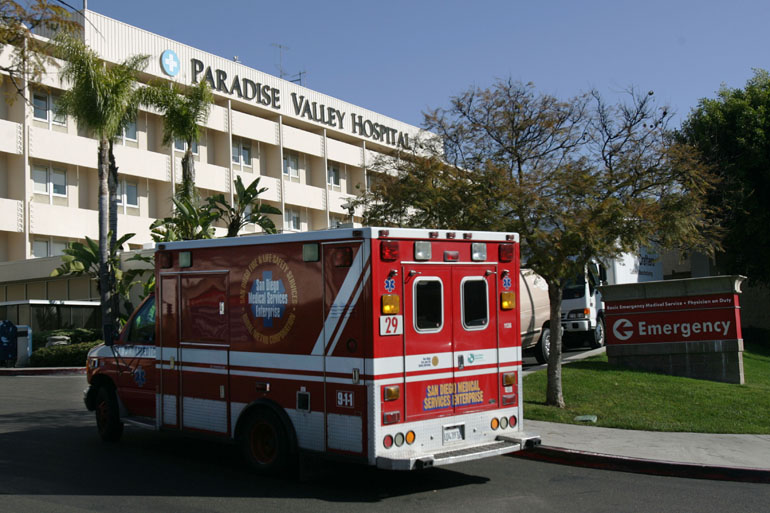More than 7,300 patients at a San Diego-area hospital may have been exposed to infection from contaminated medications last year, state records show.
The problems were traced to the compounding pharmacy lab at Paradise Valley Hospital in National City, California, where inspectors found “dust, stains and foreign material” in a supposedly sterile environment in which thousands of intravenous medications were prepared over eight months — from Jan. 1 to Aug. 18.
During their investigation into the pharmacy, California health inspectors found that oversight of infection control was lacking throughout the hospital, according to documents obtained by a reporter through the California Public Records Act.
According to the inspectors’ report, the head of infection control at the hospital not only neglected to monitor the compounding lab, but also falsified documents to cover up her failure to check practices in the operating rooms in 2015.
Paradise Valley, owned by the for-profit chain Prime Healthcare Services, fired the employee on Aug. 18 after the state uncovered her misconduct, according to state inspectors. The hospital told California officials that it also took steps to address the other problems identified by inspectors.
A spokesman for the California Department of Public Health said Paradise Valley was fined $17,500 in December following the investigation. Inspectors did not deem the problems to pose immediate jeopardy to patients, which would have been the most serious violation and could have triggered an initial fine of up to $75,000.
The spokesman, Ronald Owens, said the state “did not identify actual harm to any patients” and that regulators accepted the hospital’s plan of correction. State officials did not say how they investigated the question of patient harm.
The hospital is appealing the state’s penalty, saying outside lab tests determined there was no contamination of the pharmacy or medications.
A Prime Healthcare spokeswoman said it wasn’t necessary to notify patients who received the compounded medications during the eight-month period because “further analysis found no evidence of contamination during this time period.”
Most hospitals perform compounding, which involves mixing or altering approved drugs to meet a patient’s specific needs. Intravenous medications and patient nutrition make up much of the compounding work in hospitals.
Unsanitary conditions in a compounding pharmacy can pose a serious risk to patients because bacteria can grow on surfaces and equipment, leading to contamination of IV drugs and potentially lethal infections. In 2012 and 2013, for example, a nationwide meningitis outbreak was tied to contaminated injections made by a compounding pharmacy in Massachusetts. More than 700 people were sickened, including 64 who died.
The state said the Paradise Valley pharmacy knew that samples taken from workers’ gloved fingertips had tested positive for bacterial growth, but those employees were allowed to continue mixing IVs despite the contamination danger that activity posed.
“The hospital did not act on the data showing eight of 11 pharmacy technicians failed the test,” wrote the state inspectors, who work on behalf of the U.S. Centers for Medicare and Medicaid Services. “These failures resulted in the potential from 1/1/15 to 8/18/15 for 7,301 patients to be exposed to preventable infections from 4,322 contaminated IV medications.”
In addition, the state inspection reports said the hospital’s chief nursing officer and an administrator confirmed that the infection-control officer falsified a checklist for observing designated practices in the operating rooms. In one example, she altered a 2013 form to make it appear that surveillance was done in 2015, the state found.
The infection-control officer “acknowledged altering and falsifying the [operating rooms] audit record to make it appear as though she was current in her surveillance of that department. She informed them that she had not performed any audits in the [operating rooms] in 2015 and that the year just got away from her,” according to the state records.
Paradise Valley declined to identify the infection control official. It told inspectors that the employee was terminated because “unethical behavior is not acceptable and not tolerated.”
In addition to the hospital’s poor maintenance of hygiene in the pharmacy, it “failed to ensure that the special care nursery, operating room and the emergency department were maintained to ensure an acceptable level of cleanliness, safety and quality,” the state inspectors said.
State officials also cited Paradise Valley for other deficiencies related to medications.
The hospital’s staff failed to adequately review physician orders and put some patients at risk for overdoses on narcotic pain medications, the state said. Paradise Valley also failed to discard some expired drugs and didn’t have medications available in the operating room for potential emergencies.
Paradise Valley said it has taken measures to correct the range of problems cited by inspectors. The hospital pledged, for instance, to work on its compliance rate for hand-washing. In May 2015, 62 percent of staff were observed performing proper hand hygiene. That was worse than the 2014 rate of 65 percent and far short of the hospital’s goal of 100 percent.
The hospital also told state officials that it had instituted a new cleaning process for the compounding area and began ordering some medications from outside the hospital until technicians in the pharmacy met the appropriate standards, according to state records.
Last year, the U.S. Health and Human Services’ inspector general issued a report calling for better oversight of compounded drugs in hospitals and urging stricter inspections.
Susan Dolan, president of the Association for Professionals in Infection Control and Epidemiology, said the government findings at Paradise Valley indicate several safety breakdowns that could endanger patients.
“There are standards hospital pharmacies should be following to prevent contamination,” said Dolan, an epidemiologist at Children’s Hospital in Aurora, Colorado. “Any deviation can affect patients in a negative way, even including death.”
Prime Healthcare, based in Ontario, has become one of the nation’s largest health systems by acquiring financially struggling hospitals across the country. It runs 43 hospitals in 14 states. The company purchased Paradise Valley Hospital in 2007.
This story was produced by Kaiser Health News, which publishes California Healthline, a service of the California Health Care Foundation.
